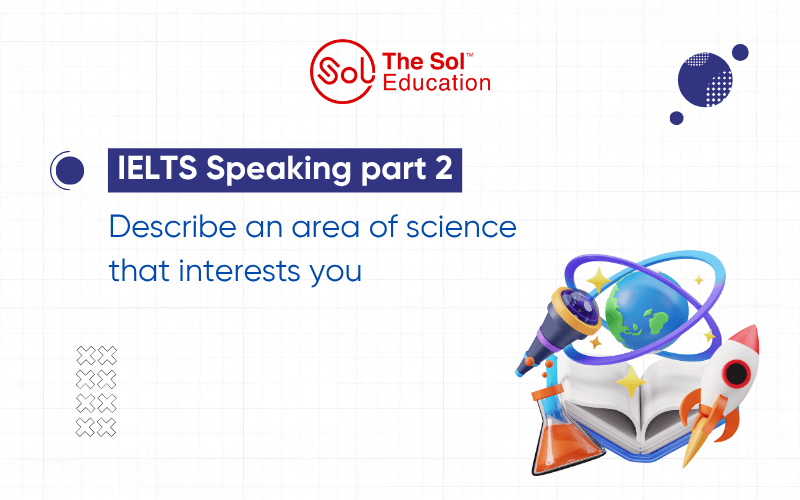Trong bài viết này, các bạn hãy cùng SOL IELTS trả lời các câu hỏi IELTS Speaking part 2 và IELTS Speaking part 3 topic Describe an area of science that interests you nhé.
Describe an area of science that interests you
You should say:

Dưới đây là một số ý tưởng bạn có thể sử dụng để phát triển bài nói của mình nè:
Astronomy (Thiên văn học): Exploring stars, planets, and the universe (Khám phá các vì sao, hành tinh và vũ trụ)
Environmental science (Khoa học môi trường): Learning about climate change and conservation (Tìm hiểu về biến đổi khí hậu và bảo tồn)
Inspired by a school teacher (Được truyền cảm hứng từ giáo viên ở trường): A passionate teacher made the subject exciting (Một giáo viên nhiệt huyết khiến môn học trở nên thú vị)
Watching documentaries (Xem phim tài liệu): Gained interest through TV shows or online videos (Quan tâm nhờ xem chương trình truyền hình hoặc video trực tuyến)
Reading books or articles (Đọc sách hoặc bài báo): Found interesting facts in magazines or websites (Tìm thấy thông tin thú vị trong tạp chí hoặc trang web)
School lessons (Bài học ở trường): Learned through classes or experiments (Học qua các tiết học hoặc thí nghiệm)
Online courses or apps (Khóa học trực tuyến hoặc ứng dụng): Studied using platforms like YouTube or apps (Học qua các nền tảng như YouTube hoặc ứng dụng)
Helps solve real-world problems (Giải quyết các vấn đề thực tế): The science addresses issues like pollution or health (Khoa học giải quyết các vấn đề như ô nhiễm hoặc sức khỏe)
Fascinating discoveries (Những khám phá hấp dẫn): Exciting breakthroughs or new knowledge (Những đột phá hoặc kiến thức mới thú vị)
Well, I’d like to talk about biology, which is a science that I find really interesting. Biology is about studying living things, like plants, animals, and even humans. I got interested in it when I was in high school. My biology teacher was very kind, and she always explained things in a simple way. She showed us experiments, like looking at cells under a microscope, and that made me feel excited.
I learn biology mostly from school lessons and textbooks. Sometimes, I also watch videos on the internet, like on YouTube, to understand more about topics like how the human body works. It’s not always easy, but I try to read simple articles or watch short clips to learn new things.
I think biology is interesting because it helps me understand life better. For example, I learned how plants make food or how our heart works, and it feels amazing to know these things. Also, biology is useful because it can help solve problems like diseases or pollution. That’s why I like it.
Danh sách từ vựng hữu ích:
biology /baɪˈɒlədʒi/: sinh học
living things /ˈlɪvɪŋ θɪŋz/: sinh vật sống
experiments /ɪkˈsperɪmənts/: thí nghiệm
microscope /ˈmaɪkrəskəʊp/: kính hiển vi
human body /ˈhjuːmən ˈbɒdi/: cơ thể con người
pollution /pəˈluːʃn/: ô nhiễm
I’d like to talk about environmental science, which has always fascinated me. This field focuses on understanding the natural world and how we can protect it, covering topics like climate change, conservation, and sustainable development.
My interest in this science began a few years ago when I watched a documentary about global warming. The images of melting glaciers and endangered animals really struck a chord with me, and I realized how urgent it is to address these issues. That documentary sparked my curiosity, and since then, I’ve been keen to learn more.
As for how I study environmental science, I mostly rely on online resources. I follow websites and social media accounts that share updates about environmental issues, and I’ve taken a short online course about sustainability. Occasionally, I attend local workshops or community events focused on recycling or clean energy, which are great for hands-on learning.
What makes environmental science so compelling to me is its real-world impact. It’s not just about theories; it’s about finding practical solutions to problems like air pollution or deforestation. Knowing that this science can help create a better future for our planet is incredibly motivating, and it inspires me to stay informed and maybe even contribute in some small way.
Danh sách từ vựng hữu ích:
environmental science /ɪnˌvaɪrənˈmentl ˈsaɪəns/: khoa học môi trường
climate change /ˈklaɪmət tʃeɪndʒ/: biến đổi khí hậu
conservation /ˌkɒnsəˈveɪʃn/: bảo tồn
sustainable development /səˈsteɪnəbl dɪˈveləpmənt/: phát triển bền vững
struck a chord /strʌk ə kɔːd/: gây ấn tượng mạnh
sparked my curiosity /spɑːkt maɪ ˌkjʊəriˈɒsəti/: khơi dậy sự tò mò
hands-on learning /ˌhændz ˈɒn ˈlɜːnɪŋ/: học qua thực hành
deforestation /diːˌfɒrɪˈsteɪʃn/: phá rừng
Sample Answer 1: Band 6.0–6.5
I think some children don’t like science because it can be difficult. Subjects like physics or chemistry have a lot of formulas and hard words, so it’s not easy to understand. Also, some teachers make the lessons boring by just reading from the book, and that makes students lose interest. Another reason is that some kids think science is not useful for their future, so they don’t want to study it.
Danh sách từ vựng hữu ích:
formulas /ˈfɔːmjələz/: công thức
lose interest /luːz ˈɪntrəst/: mất hứng thú
useful /ˈjuːsfl/: hữu ích
Sample Answer 2: Band 7.5–8.0+
There are several reasons why some children find science unappealing at school. Firstly, the complexity of certain topics, like chemical reactions or mathematical equations in physics, can feel overwhelming, especially if they’re not explained in an engaging way. Secondly, teaching methods play a big role. If lessons are too theoretical or lack interactive elements like experiments, students might feel disconnected. Lastly, some children may not see the relevance of science to their daily lives, which reduces their motivation to engage with the subject.
Danh sách từ vựng hữu ích:
unappealing /ˌʌnəˈpiːlɪŋ/: không hấp dẫn
overwhelming /ˌəʊvəˈwelmɪŋ/: quá sức
engaging /ɪnˈɡeɪdʒɪŋ/: thu hút
relevance /ˈreləvəns/: sự liên quan
Sample Answer 1: Band 6.0–6.5
Yes, I think it’s important to study science at school. Science helps us understand the world, like how things work or why we need to take care of nature. It’s also useful for jobs, like becoming a doctor or engineer. Even if we don’t use science every day, it teaches us how to think and solve problems, which is good for life.
Danh sách từ vựng hữu ích:
take care of /teɪk keər əv/: chăm sóc
solve problems /sɒlv ˈprɒbləmz/: giải quyết vấn đề
Sample Answer 2: Band 7.5–8.0+
Absolutely, studying science at school is crucial. It equips students with a fundamental understanding of the natural world, from how ecosystems function to the principles behind technology. Beyond that, science fosters critical thinking and problem-solving skills, which are invaluable in any career or daily life. Moreover, with issues like climate change becoming more pressing, a basic knowledge of science empowers people to make informed decisions and contribute to society.
Danh sách từ vựng hữu ích:
equips /ɪˈkwɪps/: trang bị
fosters /ˈfɒstəz/: thúc đẩy
invaluable /ɪnˈvæljuəbl/: vô giá
empowers /ɪmˈpaʊəz/: trao quyền
Sample Answer 1: Band 6.0–6.5
I think biology is the most important science subject for children. It teaches about life, like how our body works or how plants grow. This is useful because it helps us stay healthy and take care of the environment. Other subjects like physics are also good, but biology is easier to understand and more connected to our life.
Danh sách từ vựng hữu ích:
stay healthy /steɪ ˈhelθi/: giữ sức khỏe
connected to /kəˈnektɪd tə/: liên quan đến
Sample Answer 2: Band 7.5–8.0+
In my view, environmental science stands out as the most vital subject for children to learn. It addresses pressing global issues like climate change, pollution, and biodiversity loss, which directly affect our planet’s future. Understanding these topics encourages young people to adopt sustainable habits and think critically about their impact on the environment. While subjects like biology or physics are also essential, environmental science has a broader, more immediate relevance to the challenges we face today.
Danh sách từ vựng hữu ích:
stands out /stændz aʊt/: nổi bật
biodiversity /ˌbaɪəʊdaɪˈvɜːsəti/: đa dạng sinh học
adopt sustainable habits /əˈdɒpt səˈsteɪnəbl ˈhæbɪts/: áp dụng thói quen bền vững
Sample Answer 1: Band 6.0–6.5
I think it depends. Some people should study science after school, especially if they want to be doctors or scientists. But for others, it’s okay not to study science if they don’t need it for their job. Still, I think it’s good to learn a little about science, like reading news, because it helps us understand the world better.
Danh sách từ vựng hữu ích:
depends /dɪˈpendz/: phụ thuộc
a little /ə ˈlɪtl/: một chút
Sample Answer 2: Band 7.5–8.0+
I believe continuing to study science after school is beneficial, though it depends on one’s goals. For those pursuing careers in fields like medicine or engineering, ongoing study is essential to stay updated with advancements. However, even for others, maintaining a basic curiosity about science—through reading articles or watching documentaries—can enhance their understanding of global issues like health or technology. Lifelong learning in science fosters an informed and adaptable mindset, which is valuable in today’s fast-changing world.
Danh sách từ vựng hữu ích:
pursuing /pəˈsjuːɪŋ/: theo đuổi
advancements /ədˈvænsmənts/: tiến bộ
lifelong learning /ˈlaɪflɒŋ ˈlɜːnɪŋ/: học tập suốt đời
adaptable /əˈdæptəbl/: dễ thích nghi
Sample Answer 1: Band 6.0–6.5
I usually get scientific news from the internet. I follow some pages on social media, like Facebook, where they share news about science, like new technology or space. Sometimes, I watch TV programs or YouTube videos about science because they are easy to understand. My friends also share interesting articles with me sometimes.
Danh sách từ vựng hữu ích:
follow /ˈfɒləʊ/: theo dõi
easy to understand /ˈiːzi tə ˌʌndəˈstænd/: dễ hiểu
Sample Answer 2: Band 7.5–8.0+
I stay updated on scientific news through a variety of sources. I regularly browse reputable websites like BBC Science or National Geographic for in-depth articles on topics like space exploration or medical breakthroughs. I also follow science-related accounts on social media platforms, which often share bite-sized updates or infographics that make complex ideas accessible. Additionally, I enjoy watching documentaries or listening to podcasts, as they offer engaging ways to dive deeper into scientific developments.
Danh sách từ vựng hữu ích:
reputable /rɪˈpjuːtəbl/: uy tín
in-depth /ɪnˈdepθ/: chi tiết
bite-sized /ˈbaɪt saɪzd/: ngắn gọn, dễ tiếp cận
accessible /əkˈsesəbl/: dễ tiếp cận
